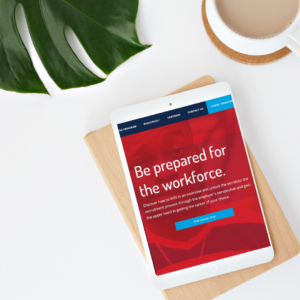Every young person, from early school leavers to Post-Graduates, is looking to start their journey in life by getting full-time employment. The big question is, are you prepared and ready to enter the workforce?

Many Australian and International Students are trying to work out their career plan for when they finish their studies. How can you gain work experience to help demonstrate you are employable and ready for the workforce? You may have learnt the theory but do you have the practical skills that employers are looking for?
In a report by the Mitchell Institute, ‘Connecting the Worlds of Learning and Work’ it shows that, in 1986, the transition from education to full-time work was only 12 months. Today, the transition from education to full-time employment is around 4.7 years. In such a competitive environment, it’s important to think about your competitive edge. How can you stand out in the recruitment process and succeed in an interview to land the job of your choice?
The Advantages of a Casual or Part-time Job
Having a casual or part-time job while you are still at school or university gives you a major advantage for when you start to look for full-time employment. Having work experience while you study, puts you ahead of your competition who might not have this experience. When applying for a job, you will be able to demonstrate to your potential employer that you are reliable and have held down a casual or part-time job for some time. This demonstrates commitment and reliability. Many employers now believe that experience can sometimes be more important than relevant qualifications.
If you don’t already have a casual or part-time job, then maybe you should think again.
The Advantages of Good Work-Experience
 Work experience is designed to help young people get a feel of what it is like to work in a real work environment. Lack of work-experience can be a huge barrier for young people in getting a job. Having some sort of workplace experience will help you learn and understand the day-to-day realities of working in a particular job or industry, as well as engaging with the employer and their staff.
Work experience is designed to help young people get a feel of what it is like to work in a real work environment. Lack of work-experience can be a huge barrier for young people in getting a job. Having some sort of workplace experience will help you learn and understand the day-to-day realities of working in a particular job or industry, as well as engaging with the employer and their staff.
In an interview, you need to demonstrate to your potential employer, that you have worked in an environment that has allowed you to engage with colleagues and work in a team environment. This includes working with difference age brackets, different personalities and that you understand what employers and colleagues expect of you in the workplace.
Work experience will give you a good insight into potential employment!
The Advantages of an Internship
 Internships are designed for students to gain practical skills in what they are studying. The company offering the internship should help you transform your knowledge from theory to practical experience, giving you real life work experience. Internships is NOT slave labour. An internship is designed to help young people understand what employers look for in workers in their chosen field. The goal of an internship is to also challenge you to work out whether you are suited to a particular job, as well as help you with your technical and employability skills.
Internships are designed for students to gain practical skills in what they are studying. The company offering the internship should help you transform your knowledge from theory to practical experience, giving you real life work experience. Internships is NOT slave labour. An internship is designed to help young people understand what employers look for in workers in their chosen field. The goal of an internship is to also challenge you to work out whether you are suited to a particular job, as well as help you with your technical and employability skills.
Further to this, an internship will help you prove to a potential employer that you have experience in a work environment similar to the one you are applying for which increases your chances of getting the job. It demonstrates that you have a good understanding of what is expected and have some practical skills. Essentially, they will be able to see that you are employable.
Internships are supposed to coach and mentor you for future employment, giving you practical experience.
It’s important to note, if you are required to complete tasks that an employee would otherwise complete, you are entitled to be paid for your work. However, if your internship only requires you to sit and watch others in the organisation work, you are not entitled to be paid. If you are not sure, you can always chat to your Careers Advisor or look at the Fairwork’s regulations and guidelines.
The Advantages of Volunteer Work
 The goal of volunteer work is to throw yourself into something where you are helping an organisation to do meaningful work. Volunteering your time goes a long way to demonstrate to potential employers that you will do whatever it takes to make a difference. There are a lot of benefits to volunteering, especially for volunteers. It can help increase your professional networks, including finding possible referees for future job applications. Further, volunteering demonstrates your commitment to your potential employer. A skill that every employer is looking for in a young person in today’s world.
The goal of volunteer work is to throw yourself into something where you are helping an organisation to do meaningful work. Volunteering your time goes a long way to demonstrate to potential employers that you will do whatever it takes to make a difference. There are a lot of benefits to volunteering, especially for volunteers. It can help increase your professional networks, including finding possible referees for future job applications. Further, volunteering demonstrates your commitment to your potential employer. A skill that every employer is looking for in a young person in today’s world.
Volunteering is part of giving and networking, while also opening up bigger and better opportunities for yourself.
The Advantages of All the Above!
 As per the stats above, if it takes 4.7 years for a young person to find that job in today’s market, my recommendation is to get busy and build your profile!
As per the stats above, if it takes 4.7 years for a young person to find that job in today’s market, my recommendation is to get busy and build your profile!
You are packaging yourself as a reliable, engaging employee with some practical experience as well as demonstrating your commitment to employment. While doing the above, you need to outline your experience on LinkedIn and other social profiles. Let your potential employers see what you have been up to.
The number one thing potential employers are looking for are people who have the right attitude, who can demonstrate that they are ready to work in a team environment, as well as help the organisation achieve great outcomes and results. In an interview, you will have a huge competitive edge if you can demonstrate gratitude for the type of work you have done in the past, and that you fully understand what it takes to transition from education to industry.
You need to build your network and have a list of referees that demonstrates your work experience while you complete your studies or degree. It’s a competitive workforce and potential employers will always go for right attitude and experience over having no experience at all.
*Please note: Every workplace must follow Fair Work Australia guidelines for any type of work experience, internship, casual, part-time and full-time employment.
To Help You…
 Keyba Careers has developed an online training program that is a short course targeted to Australian and International Students. We provide great insight and tips for job application and interview techniques to give you a head start on the journey to casual, part-time or full-time employment!
Keyba Careers has developed an online training program that is a short course targeted to Australian and International Students. We provide great insight and tips for job application and interview techniques to give you a head start on the journey to casual, part-time or full-time employment!
Our Keyba Careers Employer Engagement program has been trialed and tested to include the following online lessons, perfect for today’s young workforce!
Our – lessons cover the following, and the first lesson is FREE!
- Lesson 1 – How to get a Job
- Lesson 2 – Understanding Business in Today’s World
- Lesson 3 – Understanding What Customer Service Is
- Lesson 4 – Having a Good Sales Approach
- Lesson 5 – How to Sell Yourself Over the Phone
- Lesson 6 – Understanding the Recruitment Process
- Lesson 7 – Developing Your Career Plan
At Keyba Careers, we have a point of difference in giving young people great insight from an employer’s prospective. We also have proven, 75% success rate for young people in finding a job of their choice. At Keyba Careers, we teach young people what employers are looking for in today’s young talent. More importantly we give young people all the tips to help you succeed in the transition from study to money! Register today!
If you would like help or want to know more about Keyba Careers, please visit our website or contact us for more information at Keyba Careers on 1300 4 ADVICE!
* https://keybacareers.com.au/uncategorized/connecting-the-worlds-of-learning-and-work-report-by-mitchell-institute/

